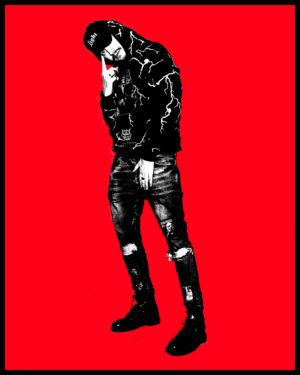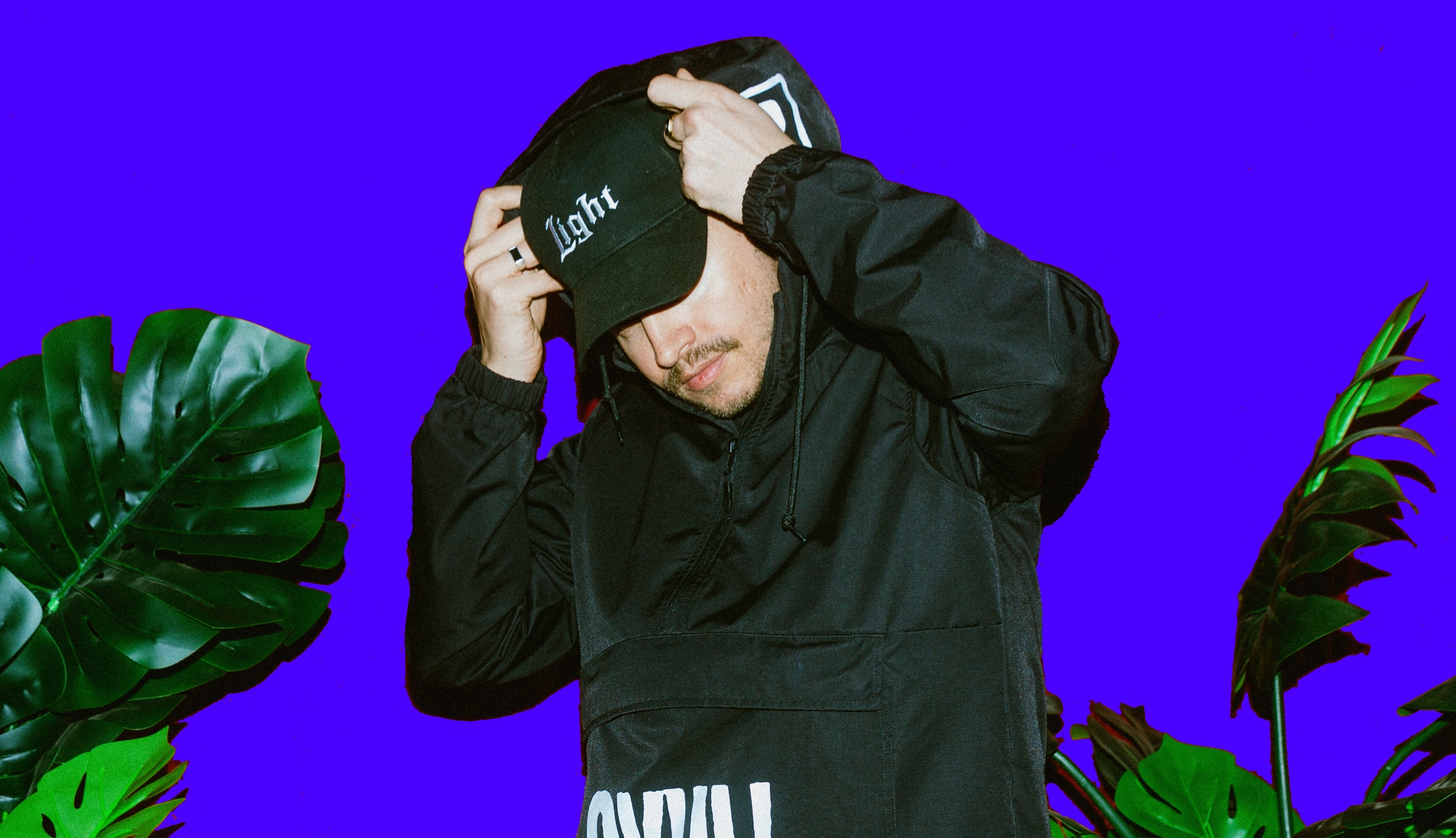It feels like the past 16 months have given out-of-work musicians plenty of time to drum up the courage to hop into each other’s DMs to profess an often-reciprocated respect for the other’s work, frequently resulting in collaboration and a press release packed with quotes from both parties spelling out the seamless process of making art together. Yet this is just one of many ways Travis Egedy has proven himself to exist in a not-too-distant future, whether he exhibits it through his ahead-of-the-curve paintings and clothing brand, or his decade-long career as Pictureplane, an alias born of the grimy Denver warehouse scene of the late ’00s. After coming up in an outré national electronic movement, remixing and being remixed by artists like HEALTH and Crystal Castles, Egedy only seems to have gravitated further underground rather than taking the considerably more public festival lineup route.
In spite of the singular path he’s taken from the modern electroclash classic Thee Physical to more recent releases likely shaped by growing interests in the minimalism of dungeon synth and the maximalism of black metal, it would be inaccurate to say that he’s making the trek alone. His latest album Dopamine arrives today through 100% Electronica—a label that’s becoming less a hub for vaporwave artists and more a community of broader electronic artists who share Egedy’s DIY philosophy—and it features vocals from three members of GothBoiClique, a collective that shares Pictureplane’s uniquely dark aesthetic, introducing a generally younger audience to the remnants of a brief period in music prohibitively dubbed “witch house.” To hear him talk about these and other collaborations foreshadows the way most other recent high-profile collaborations seem to have come about: a mutual respect among, in this case, trend-bucking artists.
With the release of Dopamine, Pictureplane builds upon the grimy, “real-life hacker shit” darkwave of 2018’s Degenerate, with, intentionally or not, cool blasts of vaporwave on the opening track “Avalanche,” as well as a few of the instrumental numbers later on the album, while the moody guitar intro on “Black Chardonnay” makes appearances from GBC members Wicca Phase Springs Eternal and Yawns feel more than welcome. We caught up with Egedy to discuss his collaborations, life as a hacker, and his plans to re-releases his long-out-of-print 2011 record Thee Physical via his new label.
How did your signing with 100% Electronica come about?
I’m definitely a big fan of George Clanton and Negative Gemini. We’re friends, we’ve played shows together, and I’ve known Negative Gemini for years—we’ve always been in the same scene. I self-released my last album through Alien Body, my clothing brand, and I knew with this record I wanted to work with someone, and when I saw 100% Electronica was putting out the Small Black album, who are other good friends of mine, I was like, “Maybe I should hit them up too.” I just kind of sent Negative Gemini a message like, “Would you be willing to work with me to put out my new album,” and immediately they were just like, “Yes, let’s do it.” This was during COVID, so we started Zoom calling together and talking about what a Pictureplane record would look like with them, and it just felt really right. We were able to talk for hours about everything, and it just felt really right.
I was wondering about the timeline of the signing because I was surprised to listen to “Avalanche” and hear the drop on the chorus, which sounds a lot like something that would be put out by this label.
I think that was coincidental. Obviously, a lot of what 100% Electronica puts out is vaporwave stuff—which, I love vaporwave, but I’m definitely not a vaporwave artist. I like a bit more aggressive and noisier sounds. At the same time, I feel like my connection to 100% Electronica is that it’s all DIY, underground electronic music, which is a broad soundscope. I don’t think I was necessarily influenced by the label when I was making this record, I just wanted it to be a Pictureplane album. I think I made “Avalanche” before I even knew that I was gonna be putting the record out with them.
“I feel like my connection to 100% Electronica is that it’s all DIY, underground electronic music, which is a broad soundscope. I don’t think I was necessarily influenced by the label when I was making this record, I just wanted it to be a Pictureplane album.”
It seems like you gravitate toward collaboration with pockets of music that have big underground followings, but don’t get a lot of press—do you mean to shy away from artists with a broader appeal?
The people I end up working with are either people whose music I enjoy, or I become friends with them personally. I’ve gotten to know all the GothBoiClique guys very well over the years, and they’ve just become my personal friends. I don’t care who’s being covered in what press or what magazine—most of the music I like is pretty obscure. I’m listening to weird black metal, or some dungeon synth stuff on YouTube. I don’t really search for what’s hot in the press, I’ve never been that kind of guy. I’m just into people who are making interesting, creative work. Those are the people I wanna hang out with, just artists doing cool shit.
Did you know Adam McIlwee before he was doing Wicca Phase?
No, I didn’t. A friend of mine in Texas was basically like, “You’ve gotta listen to Wicca Phase.” I was getting a tattoo from him and he was playing it, so that’s how I first heard him, and I was like, “Oh this is really dope.” And then he booked a show for us in Houston together—this was, like, 2016. So we all got to hang out. And Wicca Phase always told me he was a huge Pictureplane fan, so we just kind of bonded right away. I love his music so much, so we just became good friends out of a mutual respect and admiration for each other. But I’m not too familiar with his previous band, Tigers Jaw, actually, I’m definitely more of a Wicca Phase fan.
I also just heard your song with PRAYERS.
Yeah, we recorded it years ago, and it took a long time for the music video to drop. I really love PRAYERS a lot, they’re great friends of mine, we’ve played a lot of shows together. That was another one where when they were first coming out I was watching their videos and I was like, “These guys are fucking amazing.” I just really thought what they were doing was really cool, so I reached out to Raphael like, “What’s up, I love your music,” and he was like, “Pictureplane, I love your shit too man!” I went to one of their shows around 2015 and we just kind of became good friends immediately. I was really excited that they fucked with me and my music, it was another cool mutual respect thing. Raphael kind of brought me into his world, I love that guy a lot.
I actually got to go to Raphael and his wife Kat Von D’s wedding, which was really incredible. I rode in a van with Bam Margera to the wedding, and when I showed up at the reception they were playing my music for everyone over the main soundsystem. It was so surreal. Like, Moby was standing there. I was like, “Hey, man, I like your music, Moby, what’s up.” Like, while Pictureplane was playing.
“It’s not even inspiration, I am a cyberpunk—that’s kind of just what my life has become since I was really young living in DIY houses in Denver and throwing our own shows, creating our own reality that was futuristic and grimy.”
I wanted to ask about the aesthetic of your music, how it feels inspired by ’90s cyberpunk movies. How do you find those images and ideas inform your music?
I guess it’s not even inspiration, I am a cyberpunk—that’s kind of just what my life has become since I was really young living in DIY houses in Denver and throwing our own shows, creating our own reality that was futuristic and grimy. So I think I’ve kind of just been living that lifestyle in an authentic way. Maybe that sounds cheesy, but yeah, it’s real-life hacker shit. But I do love cyberpunk stuff. Snow Crash by Neil Stephenson—I remember when I first read that book it really blew my mind. I think books and films always have been a huge influence on me in my music, but I’m not specifically trying to make cyberpunk music, it’s just how it comes out. I don’t sit down and be like, “Oh, I’m gonna make this genre today.” I approach with a lot more spontaneity, and tracks just kind of come out however they do.
Can you talk a bit about the 10-year vinyl reissue you’re planning for Thee Physical?
Yeah, I did, like, a 20-page, full-size art booklet insert with photographs from that era. I’m really excited about it because that album has been unavailable for years. Maybe we’ll do Dark Rift also, but at the moment it’s just Thee Physical. I don’t know if I want to re-release Dark Rift—it’s really cool, but that music to me is really primitive. I was just coming into my own as Pictureplane at that time, I feel like I’ve improved so much as an artist since then. It’s really crude and lo-fi, which I guess is why people liked it at the time. But that’s the beautiful thing about music and art: It encapsulates a time. When you make a recording or a painting, it’s frozen there for eternity, that time that you made it. I’ve always loved that—art reflects the time it was made in, and, yeah, it’s certainly a different time now than 2009. It feels like a whole other world ago. FL








